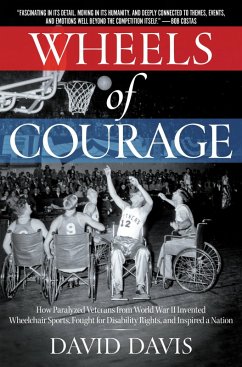Out of the carnage of World War II comes an unforgettable tale about defying the odds and finding hope in the most harrowing of circumstances.
Wheels of Courage tells the stirring story of the soldiers, sailors, and marines who were paralyzed on the battlefield during World War II-at the Battle of the Bulge, on the island of Okinawa, inside Japanese POW camps-only to return to a world unused to dealing with their traumatic injuries. Doctors considered paraplegics to be "dead-enders" and "no-hopers," with the life expectancy of about a year. Societal stigma was so ingrained that playing sports was considered out-of-bounds for so-called "crippled bodies."
But servicemen like Johnny Winterholler, a standout athlete from Wyoming before he was captured on Corregidor, and Stan Den Adel, shot in the back just days before the peace treaty ending the war was signed, refused to waste away in their hospital beds. Thanks to medical advances and the dedication of innovative physicians and rehabilitation coaches, they asserted their right to a life without limitations. The paralyzed veterans formed the first wheelchair basketball teams, and soon the Rolling Devils, the Flying Wheels, and the Gizz Kids were barnstorming the nation and filling arenas with cheering, incredulous fans. The wounded-warriors-turned-playmakers were joined by their British counterparts, led by the indomitable Dr. Ludwig Guttmann. Together, they triggered the birth of the Paralympic Games and opened the gymnasium doors to those with other disabilities, including survivors of the polio epidemic in the 1950s.
Much as Jackie Robinson's breakthrough into the major leagues served as an opening salvo in the civil rights movement, these athletes helped jump-start a global movement about human adaptability. Their unlikely heroics on the court showed the world that it is ability, not disability, that matters most. Off the court, their push for equal rights led to dramatic changes in how civilized societies treat individuals with disabilities: from kneeling buses and curb cutouts to the Americans with Disabilities Act of 1990. Their saga is yet another lasting legacy of the Greatest Generation, one that has been long overlooked.
Drawing on the veterans' own words, stories, and memories about this pioneering era, David Davis has crafted a narrative of survival, resilience, and triumph for sports fans and athletes, history buffs and military veterans, and people with and without disabilities.
Dieser Download kann aus rechtlichen Gründen nur mit Rechnungsadresse in A, B, BG, CY, CZ, D, DK, EW, E, FIN, F, GR, HR, H, IRL, I, LT, L, LR, M, NL, PL, P, R, S, SLO, SK ausgeliefert werden.
Es gelten unsere Allgemeinen Geschäftsbedingungen: www.buecher.de/agb
Impressum
www.buecher.de ist ein Internetauftritt der buecher.de internetstores GmbH
Geschäftsführung: Monica Sawhney | Roland Kölbl | Günter Hilger
Sitz der Gesellschaft: Batheyer Straße 115 - 117, 58099 Hagen
Postanschrift: Bürgermeister-Wegele-Str. 12, 86167 Augsburg
Amtsgericht Hagen HRB 13257
Steuernummer: 321/5800/1497
USt-IdNr: DE450055826
Bitte wählen Sie Ihr Anliegen aus.
Rechnungen
Retourenschein anfordern
Bestellstatus
Storno


